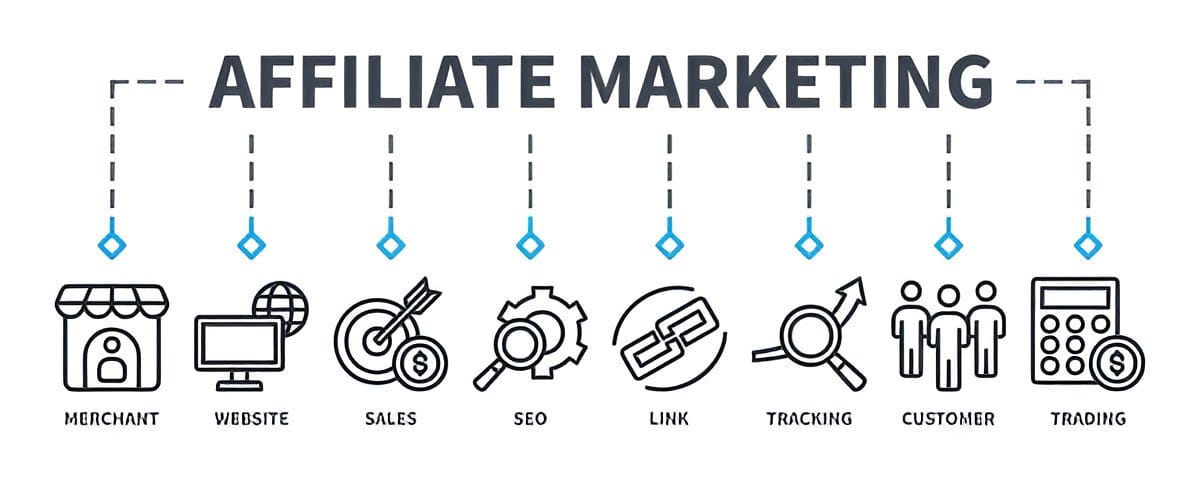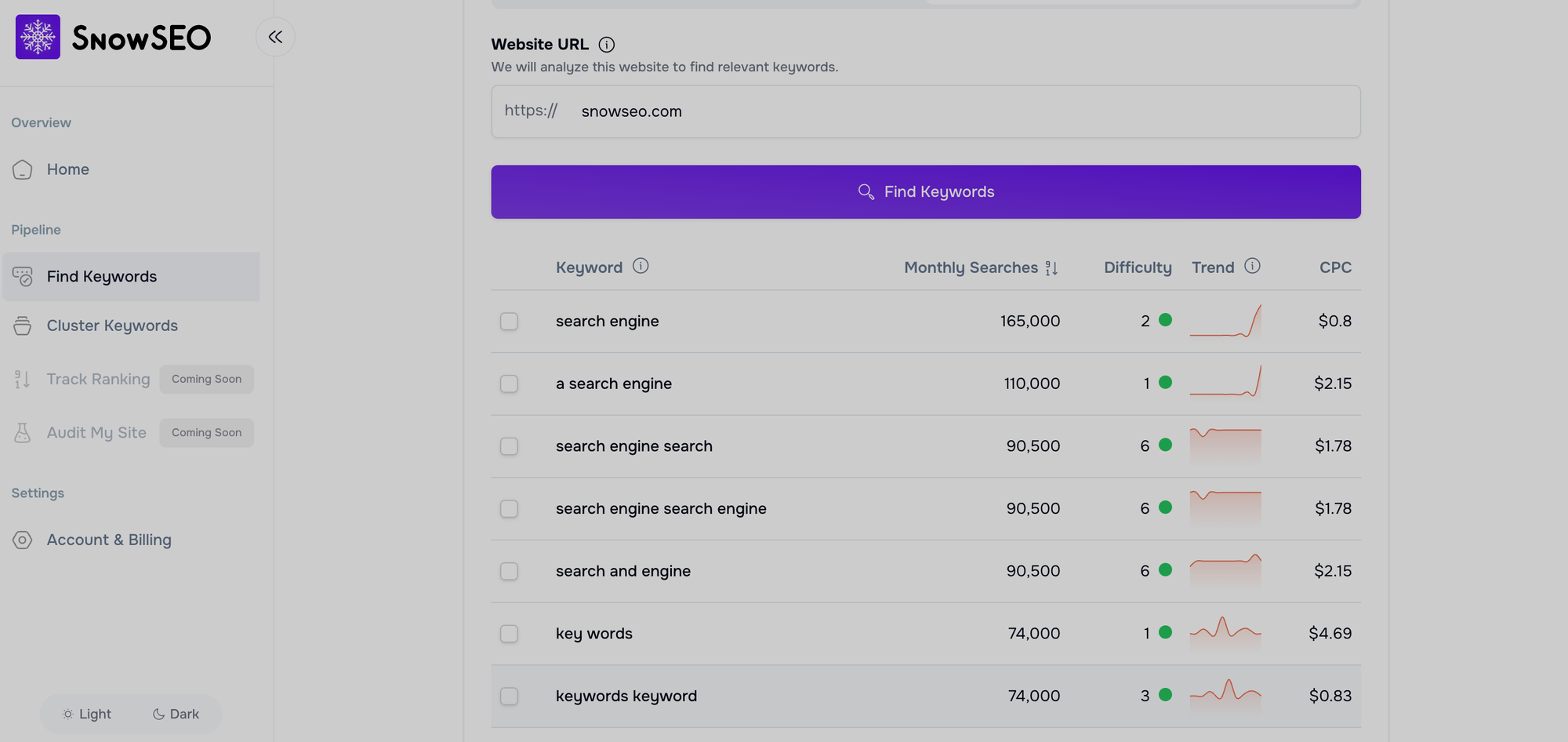
Ultimate Guide to Keyword Strategies for Affiliate Marketers
Stop wasting time on broad keywords! This guide reveals the power of long-tail keywords in affiliate marketing. Learn how to find these hidden gems and attract highly qualified traffic that converts into sales.
Table of Contents
Below is a reorganized, comprehensive blog post that combines all three pieces into one ultimate guide. You can adjust or tweak sections as needed for your brand and audience.
Boost Traffic, Conversions, and Commissions with Targeted Tactics
Understanding What Is Affiliate Marketing
Affiliate marketing is a performance-based strategy where you (the affiliate) promote another company’s product or service—and earn a commission when your audience takes the desired action. Key players include:
- Merchant/Advertiser: The business offering the product or service.
- Affiliate/Publisher: You—the content creator or influencer promoting the product.
- Consumer: The end user who clicks your unique affiliate link.
- Affiliate Platform/Network: The technology that tracks clicks, conversions, and commissions.
Key Fact:
Affiliate marketing is estimated to account for about 16% of all online orders in the U.S., and top-performing programs (like Amazon Associates) command nearly half of the affiliate market share.
Why Keyword Research is Crucial for Affiliate Marketing

Keyword research is the compass that guides your content creation and SEO efforts. It helps you:
- Connect with the Right Audience: Align your content with users actively seeking solutions.
- Improve Search Rankings: Optimized keywords increase your visibility on search engines.
- Drive Targeted Traffic: Attract visitors who are ready to convert.
- Maximize ROI: Focus your efforts on high-converting, low-competition keywords.
Without effective keyword research, even high-quality content risks getting lost in the vast online space.
Understanding User Intent In Affiliate Marketing
Before you dive into tools and tactics, it’s essential to understand why users search. User intent falls into four primary categories:
As an affiliate marketer, your focus is typically on commercial investigation and transactional keywords, which signal that the user is closer to making a purchase decision.

Step-by-Step Keyword Strategy Framework For Affiliate Marketing
1. Niche Selection: Start Narrow
- Identify Your Passion & Expertise: Choose a niche that resonates with you.
- Drill Down: For example, from Fitness → Running Shoes → Vegan Running Shoes for Flat Feet.
- Validate Demand: Use tools like Google Trends and AnswerThePublic.
2. Analyze Search Intent
Ensure your keywords align with user needs by categorizing them:
Source: Hostnoc (2024)
3. Use Advanced Tools for Keyword Discovery
Some popular tools include:
4. Prioritize Long-Tail Keywords
Long-tail keywords are longer, more specific phrases (e.g., “best noise-canceling headphones for travel”). They offer:
- Lower Competition: Easier to rank for.
- Higher Conversion Rates: More targeted and specific.
Example Comparison:
- Broad: “Headphones” (High competition, 10K searches/month)
- Long-Tail: “Wireless headphones under $100 for gym” (Lower competition, 500 searches/month)
5. Spy on Competitors
- Analyze Competitor Content: Use tools like SnowSeo or Ahrefs.
- Identify Gaps: For instance, if competitors target “best protein powder,” you might target “best vegan protein powder for weight loss.”
Keyword Strategy in Action: Standing Desk Example
- Seed Keyword: "Standing Desk"
- Long-Tail Keywords:
- "Best standing desk for small home office"
- "Affordable standing desk converter"
- "Standing desk with keyboard tray"
- "Ergonomic standing desk for tall people"
- Commercial Keywords:
- "Cheap standing desk"
- "Discount standing desk"
- "Buy standing desk now"

Advanced Keyword Strategies For Affiliate Marketing
1. Focus on Long-Tail & Buyer Intent Keywords
- Example: Instead of “affiliate marketing,” try “how to start affiliate marketing for beginners.”
- Leverage Buyer Intent: Target keywords with clear purchase signals (e.g., “buy iPhone 14 Pro Max”).
2. Keyword Clustering
- Group Related Terms: Create clusters such as “affiliate marketing tips,” “affiliate strategies,” and “how to succeed in affiliate marketing.”
- Benefit: This improves your chances of ranking for multiple related keywords with one comprehensive piece.
3. Incorporate Seasonal & Trend-Based Keywords
- Seasonal Examples: “Best Christmas gifts 2024” or “Black Friday affiliate deals.”
- Stay Relevant: Adjust your keyword strategy based on upcoming events or seasonal trends.
4. Competitor Analysis & Keyword Gap Identification
- Tools: Use SnowSeo, Ahrefs, or Moz to identify what your competitors are missing.
- Opportunity: Target keywords that have significant search volume but lower competition.
Advanced Affiliate Marketing Tactics For Affiliate Marketing
Once you have the basics down, it’s time to scale your efforts:

1. Advanced Keyword & Competitor Strategies
- Keyword Clustering: Group related keywords to target multiple search intents in one piece of content.
- Deep Competitor Analysis: Use tools like SnowSeo and Ahrefs to analyze competitors’ backlink profiles, content gaps, and conversion tactics.
2. Conversion Optimization
- On-Page Optimization: Test different calls-to-action (CTAs), landing pages, and content formats to improve conversion rates.
- A/B Testing: Experiment with different headlines, images, and affiliate link placements to see what drives the most conversions.
3. Multichannel Marketing
- Email Marketing: Build and nurture an email list with targeted lead magnets and personalized recommendations.
- Social & Video Marketing: Utilize short, engaging videos on platforms like TikTok and Instagram. Combine these with live streams or product demos.
- Influencer Collaborations: Partner with micro- and macro-influencers in your niche for broader reach and authenticity.
4. Leveraging Data & Automation
- Analytics Tools: Use Google Analytics, affiliate dashboards, and heatmaps to track performance and understand user behavior.
- Automation Software: Consider platforms that integrate with your affiliate programs to streamline tracking, reporting, and payments.
5. Negotiation & Partnership Management
- Exclusive Deals: Negotiate for exclusive discounts or higher commissions with your affiliate partners.
- Relationship Building: Foster long-term relationships with high-performing affiliates by offering them support, bonuses, and early access to new products.
Tools for Keyword Research

Comparison of Top Tools
Types of Keywords & Examples
Legal, Ethical, and Financial Considerations
- Disclosures: Always clearly disclose your affiliate relationships to comply with FTC guidelines and maintain trust.
- Tax Reporting: If your side hustle income exceeds $600, ensure you report it properly. Use forms like 1099-K and estimated tax forms (1040-ES) as needed.
- Compliance: Abide by intellectual property rights and consumer protection regulations to avoid legal issues.
- Ethical Marketing: Focus on honest reviews and transparent recommendations. Avoid overpromoting products that don’t genuinely serve your audience’s needs.
Real-World Examples & Visual Aids For Affiliate Marketing
Case Study: Niche Targeting in Action
An affiliate promoting eco-friendly products targeted “biodegradable phone cases” (a long-tail keyword) instead of the generic “phone cases.” The result? 3x higher conversions with minimal competition.
FAQs: Solving Common Keyword Challenges
1. What’s the best tool for beginners?
Start with Google Keyword Planner for free search volume data.
2. How do I balance search volume and competition?
Target keywords with 100–500 monthly searches and difficulty scores below 60.
3. Can I rank without backlinks?
Yes! Long-tail keywords with low competition often require minimal backlinks.
4. Can I rank without backlinks?
Yes! Long-tail keywords with low competition often require minimal backlinks.
5. How many keywords should I target per page?
Focus on one primary keyword along with 2–3 secondary keywords.
6. What is keyword clustering?
Grouping related keywords helps you create comprehensive content that covers multiple search intents.
7. Should I target branded keywords?
Yes—if done strategically to capture traffic from users familiar with the brand.
8. What are the best platforms to join affiliate programs?
Consider networks like Amazon Associates, ShareASale, CJ Affiliate, and Impact—choose based on your niche.
9. What is search intent and why does it matter?
Search intent refers to the reason behind a user’s search query—informational, navigational, transactional, or commercial—and is crucial for aligning your content to meet user needs.
10. Why is keyword research so important for affiliate marketing?
It's crucial for several reasons:
- Attracting the Right Traffic: Targeting relevant keywords ensures you attract visitors interested in the products you promote.
- Improving Search Engine Rankings: Optimized content using relevant keywords helps your website rank higher in search engine results pages (SERPs).
- Increasing Conversions: By understanding user intent, you can create content that directly addresses their needs and increases the likelihood of them making a purchase.
- Finding Profitable Niches: Keyword research can uncover untapped niche markets with high demand and low competition.
- Creating Targeted Content: Knowing the questions your audience is asking allows you to craft helpful and informative content.
11. What's the difference between "search volume" and "keyword difficulty?"
- Search Volume: Represents the average number of times a specific keyword is searched for in a given period (usually monthly). Higher search volume indicates greater potential traffic.
- Keyword Difficulty: (Also known as Keyword Competition) Estimates how hard it will be to rank on the first page of Google for a particular keyword. Higher difficulty indicates more established websites and content already competing for that keyword.
12. What are the different types of keywords relevant to affiliate marketing?
Common categories include:
- Informational Keywords: Users seeking information (e.g., "what is the best coffee maker"). Focus on providing valuable content to build trust.
- Navigational Keywords: Users looking for a specific website or brand (e.g., "Amazon coffee maker"). Less relevant for initial targeting.
- Commercial Investigation Keywords: Users researching products before buying (e.g., "best coffee maker reviews," "coffee maker vs espresso machine"). High conversion potential.
- Transactional Keywords: Users ready to buy (e.g., "buy coffee maker online," "discount coffee maker"). Highest conversion potential.
- Long-Tail Keywords: Longer, more specific phrases (e.g., "best drip coffee maker for small kitchen"). Lower search volume but higher conversion rates due to specificity.
13. What is "competitor analysis" in keyword research, and why is it important?
Competitor analysis involves identifying your main competitors in your niche and analyzing their keyword strategies. It's important because:
- Uncovers High-Performing Keywords: See which keywords your competitors are ranking for and driving traffic with.
- Identifies Content Gaps: Find areas where your competitors' content is lacking, allowing you to create better, more comprehensive resources.
- Provides Inspiration: Offers ideas for new keywords and content topics you might not have considered.
- Helps Estimate Keyword Difficulty: Analyze the authority and backlinks of ranking websites to gauge the difficulty of ranking for specific keywords.
14. How do I choose the "right" keywords for my affiliate website?
- Relevance: Keywords must be highly relevant to the products you promote.
- Search Volume: Target keywords with sufficient search volume to drive traffic to your website.
- Keyword Difficulty: Balance search volume with keyword difficulty. Focus on low-to-medium difficulty keywords initially.
- Commercial Intent: Prioritize keywords indicating a buyer's intent to increase conversions.
- Profitability: Consider the potential commission you can earn from each sale generated through a particular keyword.
How can I use long-tail keywords effectively?
- Create blog posts that address specific questions or problems related to your niche.
- Develop in-depth product reviews that target niche features and use cases.
- Answer questions on forums and online communities, linking back to your relevant content.
- Use long-tail keywords to create a comprehensive FAQ section on your website.
SEO Considerations & Best Practices
- Keyword Density: Naturally integrate your keywords throughout titles, headers, and alt texts without stuffing.
- Meta Descriptions: Craft compelling meta descriptions including your primary keyword.
- Internal & External Linking: Link to related articles and authoritative sources.
- Readability: Use short paragraphs, bullet points, and clear headings.
- Mobile-Friendliness & Page Speed: Ensure your website is optimized for both.
Conclusion & Call to Action
Keyword strategies are the foundation of your affiliate marketing success. By combining niche focus, deep analysis of user intent, and advanced research tools, you’ll unlock untapped revenue and build a loyal audience. Remember:
- Start narrow and validate your niche.
- Use advanced tools to analyze search intent and competition.
- Continuously refine your strategy based on performance and trends.
Ready to elevate your affiliate game? Download our free Keyword Checklist, experiment with the strategies above, and share your success story in the comments below. Don’t forget to share this guide with fellow marketers!
Happy Keyword Hunting and Affiliate Marketing Success!





